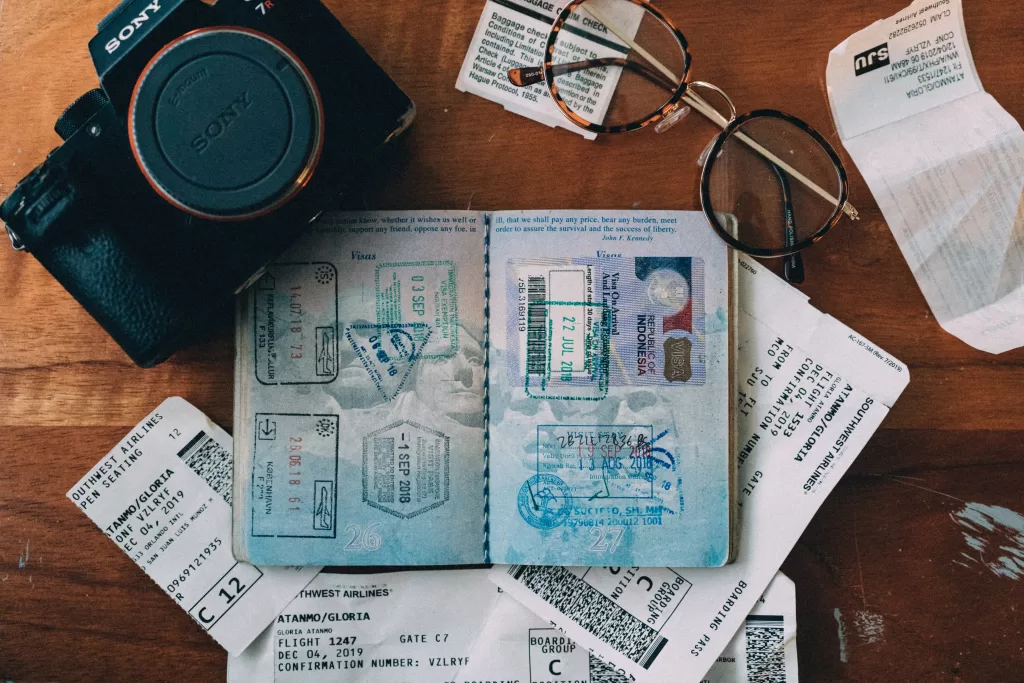Hey there wanderlust soul and budget-savvy digital nomad! Are you ready to take your remote work hustle on the road without breaking the bank? Well, you’re in luck because we’ve curated a list of the 10 most wallet-friendly cities for digital nomads! Whether you’re dreaming of sipping coconut water on a beach in Thailand or strolling through cobblestone streets in Eastern Europe, these affordable gems offer the perfect blend of adventure and affordability. So grab your laptop, pack your bags, and let’s explore where your next budget-friendly nomadic journey might take you!
Table of Contents

Introduction
The ability to work remotely has opened up a world of possibilities for location-independent workers and digital nomads. Remote workers are professionals who work outside of a traditional office, often from home or a coworking space. Digital nomads take remote work to another level by traveling and living a mobile lifestyle.
The remote work trend has exploded in recent years, fueled by advancements in communication technology and productivity tools. More companies than ever before are allowing remote work, recognizing the cost savings and increased productivity. Employees also value the flexibility and work-life balance remote work provides.
For location-independent remote workers and digital nomads, the benefits are enormous. Without the need to live near a physical office, they can choose to live wherever they want. Some do it to be near family and friends back home. Others take the opportunity to live in more affordable areas and make their earnings stretch further. Many also use the freedom to travel the world and experience new cultures and destinations. Mobility and freedom are huge advantages of the location-independent lifestyle.
With proper planning and research, remote workers can take advantage of this unique work style to improve their quality of life. The key is finding affordable cities with good infrastructure to support remote work. This article will explore the top affordable cities for remote workers and provide tips for making a move successful.
Cost of Living Considerations
When choosing a location as a digital nomad, examining the cost of living is crucial. Your money will go a lot further in cities with affordable housing, food, transportation, utilities, and health insurance.
Major expenses for digital nomads typically include:
- Housing – Renting an apartment or co-living space. Options like hostels and short-term rentals can reduce costs.
- Food – Groceries, restaurants, and takeout. Eating out less and opting for local produce can save money.
- Transportation – Public transit, taxis, rideshares, car rental, gas. Walking and biking help lower costs.
- Utilities – Electricity, water, gas, internet, cell phone. Minimizing and sharing costs helps.
- Health Insurance – Travel medical insurance to cover you while abroad. Premiums vary by location.
Choosing affordable cities allows digital nomads to maximize savings and get more value out of each paycheck. Nomads seeking to reduce expenses should research prices for housing, food, and other necessities when selecting a location. The most budget-friendly cities offer a high quality of life for less.
Top 10 Affordable Cities for Remote Workers
When choosing the best cities for remote workers, factors like cost of living, internet speeds, access to coworking spaces, and overall quality of life were considered. The following cities provide an optimal mix of low costs and good infrastructure for location-independent professionals.
1. Chiang Mai, Thailand

Nestled in the mountains in northern Thailand, Chiang Mai offers a low cost of living coupled with modern conveniences. Average monthly expenses run around $900 USD, with nice apartments renting for $300-500. With plenty of coworking spaces, cafes, and a growing nomad community, Chiang Mai makes remote work enjoyable. The downsides are the city can get very smoky during the burning season, and the internet, while sufficient, may be slower than digital nomads prefer.
2. Budapest, Hungary
Budapest emerged as an affordable option after Eastern Europe became popular with digital nomads. You can rent a city center apartment for around $700 USD per month and dine out frequently. Public transportation is cheap and efficient. Highlights include ruin pubs, thermal baths, and a pulsating nightlife. Just be prepared for cold winters and the fact that English, while common, isn’t universal.
3. Medellín, Colombia

Medellín offers digital nomads modern offices and apartments at bargain prices. Shared cowork spaces cost around $100 USD monthly. Airy apartments in safe districts run $400-600 USD. The climate is spring-like year-round and public transit is excellent. Just be ready for the language barrier and cultural differences.
4. Lisbon, Portugal
Lisbon attracts remote workers with its Old World charm, seafood, and mild climate and costs 30-40% less than other Western European capitals. Expect to spend around $1,200 USD per month. Coworking spaces abound and the internet is fast. The downsides are the hilly terrain, red tape involved in long-term stays, and small apartments. Still, Lisbon’s vibrant culture makes it a favorite.
5. Mexico City, Mexico
Mexico City emerged as a hub for digital nomads thanks to its affordable costs, thriving cultural scene, and proximity to the US. Shared workspace memberships begin at around $150 USD monthly. Food and transportation are very cheap. The cons are safety concerns in some areas, traffic congestion, and earthquakes, though most tremors are small.
6. Ho Chi Minh City, Vietnam
Located in the vibrant heart of Vietnam, Ho Chi Minh City beckons with its dynamic energy and affordability. With an average monthly expense hovering around $800 USD, digital nomads can enjoy a comfortable lifestyle without breaking the bank. Apartments, ranging from cozy studios to spacious flats, can be rented for a reasonable $300-600 per month. The city boasts a burgeoning coworking scene, bustling cafes, and a diverse nomad community, making it a haven for remote workers seeking both productivity and social connection. However, navigating the bustling streets and occasional noise pollution might pose challenges for some. Despite occasional internet hiccups, Ho Chi Minh City’s charm and affordability make it an enticing destination for budget-conscious digital nomads.
7. Kuala Lumpur, Malaysia
Set amidst the captivating skyline of Malaysia, Kuala Lumpur presents an enticing blend of affordability and modernity for digital nomads. With an average monthly expense of approximately $800 to $1000 USD, this bustling metropolis offers a range of accommodation options, from budget-friendly hostels to stylish apartments priced at $400 to $700 per month. Boasting a plethora of coworking spaces, trendy cafes, and a burgeoning digital nomad community, Kuala Lumpur provides the ideal backdrop for remote work enthusiasts seeking both productivity and social connection.
However, navigating the city’s bustling streets and occasional tropical downpours may require some adaptation. Despite occasional internet fluctuations, Kuala Lumpur’s vibrant atmosphere and affordable lifestyle make it a compelling choice for budget-conscious digital nomads looking to explore Southeast Asia’s diverse charms.
8. Quito, Ecuador

Nestled high in the Andean foothills, Quito, Ecuador, offers digital nomads a unique blend of Old World charm and modern affordability. With an average monthly expense ranging from $600 to $800 USD, this historic city provides an array of accommodation options, from cozy apartments in the colonial center to spacious flats in the trendy neighborhoods, typically priced between $300 to $600 per month.
Quito boasts a growing number of coworking spaces, eclectic cafes, and a welcoming expat community, fostering an environment that inspires both productivity and cultural immersion. However, navigating the city’s hilly terrain and occasional altitude sickness may pose challenges for newcomers. Despite occasional internet outages, Quito’s rich culture and budget-friendly lifestyle make it an enticing destination for digital nomads seeking adventure in the heart of South America.
9. Sofia, Bulgaria
Nestled in the heart of the Balkans, Sofia, Bulgaria, beckons digital nomads with its blend of affordability and Eastern European charm. With an average monthly expense ranging from $600 to $800 USD, this vibrant capital offers a diverse range of accommodation options, from cozy apartments in historic neighborhoods to modern flats in the city center, typically priced between $300 to $600 per month.
Boasting a burgeoning coworking scene, hip cafes, and a thriving expat community, Sofia provides an ideal environment for remote work enthusiasts seeking both productivity and cultural immersion. However, navigating the city’s bustling streets and the occasional language barrier may require some adjustment. Despite occasional internet fluctuations, Sofia’s rich history and budget-friendly lifestyle make it a compelling destination for digital nomads eager to explore the hidden gems of Eastern Europe.
10. Krakow, Poland

Tucked away in the heart of Poland, Krakow beckons digital nomads with its blend of medieval charm and modern affordability. With an average monthly expense ranging from $800 to $1000 USD, this historic city offers a variety of accommodation options, from cozy apartments in the Old Town to modern flats in the trendy Kazimierz district, typically priced between $400 to $700 per month.
Krakow boasts a burgeoning coworking scene, hip cafes, and a vibrant expat community, creating a dynamic environment for remote work enthusiasts seeking both productivity and cultural immersion. However, navigating the city’s cobblestone streets and the occasional language barrier may require some adaptation. Despite occasional internet hiccups, Krakow’s rich history and budget-friendly lifestyle make it an irresistible destination for digital nomads eager to explore the charms of Eastern Europe.
Digital Nomad Community
Living and working remotely in another country can seem isolating at first. That’s why having a community is so important for digital nomads. Connecting with other location-independent professionals helps combat loneliness and makes adjusting to a new culture smoother. Plus, fellow nomads can provide recommendations on everything from where to work and live to tips for securing a visa or work permit.
Many of the most popular digital nomad destinations have thriving communities both online and offline. For example, Chiang Mai, Thailand is home to major nomad hubs like PunSpace and CAMP. Medellin, Colombia boasts collaborative spaces like Neomads while Budapest, Hungary has a great coworking and coliving scene. Bangkok, Prague, Mexico City and Bali all have active Facebook groups with regular meetups.
Following relevant hashtags on Instagram or blogs is another easy way to tap into the global community. Digital nomads are generally very welcoming and eager to share their knowledge. Building connections within the expat community provides both social and practical support. It also allows nomads to give back by mentoring others new to the lifestyle. Whether taking a coding bootcamp abroad or embarking on a round-the-world adventure, having friends or mentors who understand the digital nomad experience is invaluable.
Tips for Moving Overseas
Moving abroad requires thorough preparation and planning. Here are some key tips for managing the logistics:

Visas and Residency Permits
- Research visa and residency requirements for your destination country. Many digital nomad visas now exist to facilitate long stays.
- Allow sufficient time for processing visa applications, which can take weeks or months. Consider hiring an immigration consultant.
- Look into residency programs if you plan to stay long-term and want more permanent status. These vary greatly by country.
Banking and Money Matters
- Open a bank account in your new country if possible. Having a local account makes payments easier.
- Set up a way to access money from your home accounts. Services like Wise (formerly TransferWise) offer international transfers.
- Notify your banks and credit card companies of your move to avoid disruptions. Update billing addresses.
Mail Forwarding
- Arrange mail forwarding through services like Traveling Mailbox. This gives you a stable mailing address.
- Update your address with important contacts before moving overseas.
Health Insurance
- Check if your current insurance offers overseas coverage or enroll in a travel medical plan.
- Once abroad, look into joining the national health plan if you’ll live there long-term.
Language and Cultural Adaptation
- Learn basic words and phrases in the local language to ease daily interactions. Apps like Duolingo can help.
- Read up on local customs and etiquette to avoid offending. Respect cultural norms.
- Connect with expat groups to learn from others who have already adapted.
With some preparation, moving overseas can be an exciting adventure. Taking care of logistics in advance will make the transition smoother.

Remote Job Opportunities
The rise of remote work has opened up new possibilities for digital nomads to work while traveling. Here are some of the top remote job options and tips for finding opportunities:
Types of Remote Jobs
Some of the most common remote job roles suitable for the digital nomad lifestyle include:
- Software Engineer
- Web Developer
- UI/UX Designer
- Copywriter
- Virtual Assistant
- Social Media Manager
- SEO Specialist
- Customer Support Representative
- Project Manager
- Data Entry
Jobs that involve working online or via telephone/video conferencing are ideal. Creative, tech, marketing, and administrative roles tend to have high remote work potential.
Top Remote-Friendly Companies
Many major companies now hire for remote positions worldwide, including:
- Amazon
- Apple
- Uber
- Dell
- IBM
- SAP
- Lyft
- Netflix
- Dropbox
- GitLab
- InVision
Remote job boards like FlexJobs, We Work Remotely and Remote.co frequently post openings from top employers.
Job Search Tips
Strategies for finding remote jobs include:
- Checking company websites for remote openings
- Searching on mainstream and remote-specific job boards
- Optimizing your LinkedIn profile and settings to view remote postings
- Networking online and in digital nomad communities
- Following remote companies on social media for job alerts
- Enrolling in remote internships and boot camps to gain experience
- Contacting companies directly about possible remote arrangements
Alternatives Like Freelancing
Freelancing, consulting, and entrepreneurship are also viable ways to earn an income while enjoying a location-independent lifestyle. Options include:
- Consulting in your area of expertise
- Teaching English or other languages online
- Offering freelance writing, design, web development, or marketing services
- Starting a dropshipping e-commerce business
- Monetizing a blog or YouTube channel
- Becoming a virtual assistant or social media manager
With some hustle and ingenuity, there are plenty of ways for digital nomads to fund their travels through remote work.
Coworking Spaces
Coworking spaces have exploded in popularity among remote workers and digital nomads in recent years. These shared office environments provide an affordable and collaborative workspace in cities around the world. Here’s an overview of some top coworking spaces in affordable cities for remote workers:

Medellín, Colombia
Medellín is quickly becoming a top destination for digital nomads in South America. Coworking spaces like Epicentro offers sleek, modern spaces with high-speed internet, conference rooms, and community events starting at around $80 USD per month. Epicentro helps foster a tight-knit community among digital creatives and entrepreneurs in Medellín.
Chiang Mai, Thailand
Chiang Mai in northern Thailand has developed into a major hub for digital nomads in Southeast Asia. Coworking spaces like Punspace Nimman provide an energetic coworking environment plus amenities like high-speed fiber internet, free printing, unlimited coffee, and community events for as little as $99 USD per month. Visitors can also drop in for a day pass.
Budapest, Hungary
With its affordable prices and fast internet speeds, Budapest is an appealing base for remote workers. Collaborative spaces like Kaptár offer convenient locations in the city center, ergonomic furniture, meeting rooms, community events, and daily/monthly rates starting around $7 USD per day. Kaptár helps connect location-independent professionals in the thriving Budapest startup scene.
The low costs, fast WiFi, community events, and opportunities to connect with fellow remote workers make coworking spaces in affordable cities ideal for digital nomads and remote professionals. The spaces allow mobile workers to settle in, get work done productively, and experience meaningful local community building.
Travel Considerations
One of the best parts of being a digital nomad is having the freedom to travel and experience new cultures. However, constantly being on the move can also be exhausting. Here are some tips for making travel fun and manageable as a remote worker:
Benefits of Slow Travel
- Gives you time to settle in and get to know a place better
- More opportunities to connect with locals and make friends
- Allows you to find work rhythms and spaces that suit you
- Reduces stress and travel burnout
Many digital nomads recommend staying in each location for 1-3 months if possible. This gives you a chance to live like a local rather than just passing through as a tourist. Slow travel leads to richer cultural immersion.
Managing Logistics on the Road
- Book accommodations with kitchens so you can prepare your meals
- Rent furnished apartments via services like Airbnb or VRBO for longer stays
- Consider house sitting or renting a room to reduce costs
- Look for accommodations near public transport for easier access
- Schedule any needed medical/dental visits ahead of time
- Make sure your phone plan includes data and international calling
- Pick a primary bank account that reimburses ATM fees
- Use travel booking services that allow flexible flight/hotel changes
Following general travel tips like packing light, being aware of your surroundings, and minimizing valuables can also help reduce stress during your nomadic adventures abroad.
Lifestyle Tips
Moving to a new city as a remote worker or digital nomad can be an exciting adventure, but it also comes with unique challenges. Here are some tips to help you maintain a healthy work/life balance, stay productive, and build connections in your new home.
Maintaining Work/Life Balance
- Set regular work hours and stick to them. Don’t let work bleed into your personal time.
- Take regular breaks during the workday to stretch, eat, or get outside. Breaking up long hours at the computer is essential.
- Establish a separate workspace, if possible. Working where you live can make it hard to “switch off.”
- Prioritize activities outside of work. Explore your new city, pursue hobbies, and make time for self-care.
Staying Productive and Avoiding Burnout
- Create a structure for your days and weeks. Routines can help you stay focused.
- Set realistic goals and limit multi-tasking. Don’t overextend yourself.
- Avoid distractions during work hours, like social media, TV, etc.
- Take real lunch breaks away from your computer to recharge. Eat healthy foods that provide energy.
- Get regular exercise, even if just a daily walk. Moving your body energizes you.
- Monitor yourself for signs of burnout like lack of motivation or energy. Take a break if needed.
Fostering Connections and Avoiding Loneliness
- Attend local meetups related to your interests or profession. Great way to meet like-minded people.
- Say yes to social invitations and explore the city on weekends. Making local friends combats isolation.
- Join co-working spaces or clubs to increase your social interactions.
- Use video chat to stay connected with friends/family back home. Don’t lose those support networks.
- If feeling lonely, take the initiative to strengthen relationships. Don’t just wait for others to reach out.
- Get outside daily and interact with your community. Go to cafes, events, etc.
Conclusion
Moving to an affordable city as a remote worker or digital nomad can provide many benefits compared to staying put in a high-cost-of-living area. This article summarized some of the most budget-friendly cities around the world for remote workers.
Key factors that make a city affordable for remote work include low housing costs, inexpensive food and entertainment options, good infrastructure, and an existing digital nomad community. While exact costs will vary based on your lifestyle, these destinations allow you to dramatically cut your expenses while still earning a good living.
Beyond saving money, these cities offer comfortable lifestyles and exciting opportunities. You can immerse yourself in new cultures, build connections, and have unique experiences. The low costs free up time and money to focus on passions, learning new skills, or launching a business.
If you’re feeling stuck or burnt out where you live, consider becoming a digital nomad in one of these affordable cities. Start by researching destinations, looking for remote job openings, and joining nomad communities online. Develop a budget and transition plan. With some preparation, you can begin working remotely from an exotic, low-cost city within a few months or less.
The remote work revolution has made the digital nomad lifestyle more accessible than ever. Take advantage of it to reduce expenses, explore the world, and experience new ways of living and working. By becoming location-independent, you can lead a richer, more fulfilling life.
Plan your trip with ease by visiting our Accommodation and Transportation pages. Discover unbeatable deals for a seamless and unforgettable adventure!
